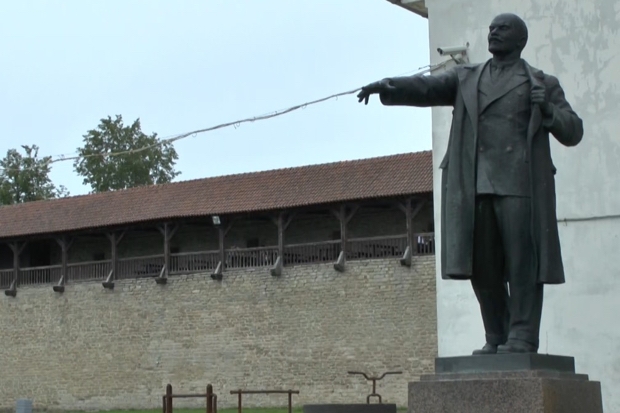For the frontline in a Cold War which has been rapidly heating up in recent years, Narva certainly does not look it. The small Estonian town on the border with Russia has a mainly ethnic Russian population, settled after the Soviet Union annexed Estonia at the end of the Second World War. However the closest (and potentially most lethal) thing to a Russian machine gun nest I could find is the 24 hour burger van next to the border post, complete with a suitably surly staff.
But is Narva’s ethnic Russian population a potential fifth column as tensions across the border with Nato increase? ‘The old babushkas in Narva are getting tired of being asked about it,’ Hannes Hanso, Estonia’s Defence Minister says in his offices in Estonia’s capital, Tallinn. ‘Every time I go abroad the question is always – is Narva next? The average pension in Narva is higher than the average wage in Ivangorod across the border. Why would they want to change?’
Anne Applebaum and Freddy Gray discuss Donald Trump’s Russian connections:
Certainly at the Maxima supermarket in Narva you can see plenty of cars with Russian numberplates stocking up with goods no longer available in their home country after EU sanctions. Russian tourists are also happily milling around the town’s medieval fortress, which faces off against its Russian equivalent across the River Narva. ‘You can see why there is interest in Narva,’ Tamel Mazer, professor of history at the University of Tartu’s Narva College, says. ‘It is probably the most Russian city in the EU, but I think it is all hype. Russians in Estonia certainly have a strong identity in terms of language and culture, but they know they would not want to move there for economic reasons.’
Despite the hype, Estonia and its Baltic counterparts Latvia and Lithuania remain Nato’s number one concern. At this month’s Warsaw summit Nato pledged to send more troops to the Baltic States, including a battalion from the UK, while the recent debate on the renewal of Trident was watched very closely here in Estonia. According to Labour’s Geraint Davies, ‘When I speak to MP’s from Latvia, Lithuania and Estonia they say to me, “We’ve got Russian minorities, just like Ukraine. Russia will invade us. If the UK doesn’t have a nuclear deterrent what are you going to do?”‘
The concern is that the Baltic States represent a soft target for a Russia keen to dominate its near abroad. If Russian forces were able to mount an invasion the Kremlin could justify to its domestic audience without a full Nato response, the founding tenet of the alliance’s Article 5 treaty would be undermined and Russia would be free to act as regional hegemon. Add in a potential Donald Trump presidency which threatens to pull back the USA from Nato and there is a sufficient reason for states bordering Russia to be worried.
Russia is also doing little to undermine these fears. A think-tank with close ties to the regime recently called for a pre-emptive occupation of the Baltic States, while opposition activists visiting Estonia have found themselves being followed overtly by Russian agents. At the Embassy in Tallinn, the staff number in their hundreds and many are suspected to be from Russia’s GRU military intelligence agency, the little green men who specialise in the agent provocateur type operations which saw Russian troops occupying the Crimean peninsula ostensibly to protect Ukraine’s Russian minority.
Hence the fear the same could happen in the Baltic States with their own large Russian populations. In Estonia this represents 30 per cent of the country, many of whom have a very different outlook to the average Estonian. ‘Most of Estonia’s ethnic Russians live in the sphere of information of the Kremlin,’ Katja Koort an Estonian Russian journalist tells me. ‘They watch Russian TV, they listen to Russian radio and even the local stations here often take up the position of the Kremlin so it’s not surprising they will have this terrible, scary view of Nato.’
While there is also a political dimension to this divide with Estonia’s Centre Party, which has strong ties to Vladimir Putin’s United Russia party, receiving consistent support from Estonian Russians, it can also be overstated. In the admittedly cosmopolitan Tallinn, most of the young Estonian Russians I spoke to had little time for nationalism seeing themselves as part of a globalised world. The feeling is mutual on the Estonian side with the country’s most popular candidate for this year’s presidential elections, foreign minister Marina Kaljurand, herself being of Russian and Latvian origin. Russian tanks making the 200 kilometre trip from Narva to Tallinn are unlikely to be garlanded with flowers anytime soon.
However with Russia’s recent history in Georgia and Ukraine, fly pasts by Russian bombers and even an Estonian agent being abducted on the border, there is genuine concern in Estonia. ‘The Russian government has a popular legitimacy which is clearly based on confrontation,’ Defence Minister Hanso says. ‘Russia has heavily militarised its Western region and we are now seeing hundreds of thousands of men who are well trained and well equipped.’ It is easy to see a Donald Trump presidency painting the Baltic States as a faraway country of which his citizens know little or nothing, but for Estonians at least, they are on the frontline protecting Western values of freedom and democracy. ‘We are defending Nato here not Estonia, Lithuania or Latvia,’ Hanso continues. ‘We are defending the UK here and everything we stand for together.’






Comments